Tokyu Fudosan Holdings has in place the Sustainability Committee, comprising executive directors and chaired by the company president, which meets twice a year in conjunction with the Risk Management Committee to address, develop action plans and oversees performance against the targets, and other important issues including compliance, climate change, social contribution and diversity. The outcomes of these joint meetings are reported to Board of Directors.
Based on reporting from the Sustainability Committee on prominent climate-related issues including those that influence management strategy, financial planning and goal setting, Tokyu Fudosan Holdings Board of Directors oversees climate-related risks and opportunities.
Organization chart of CSR promotion
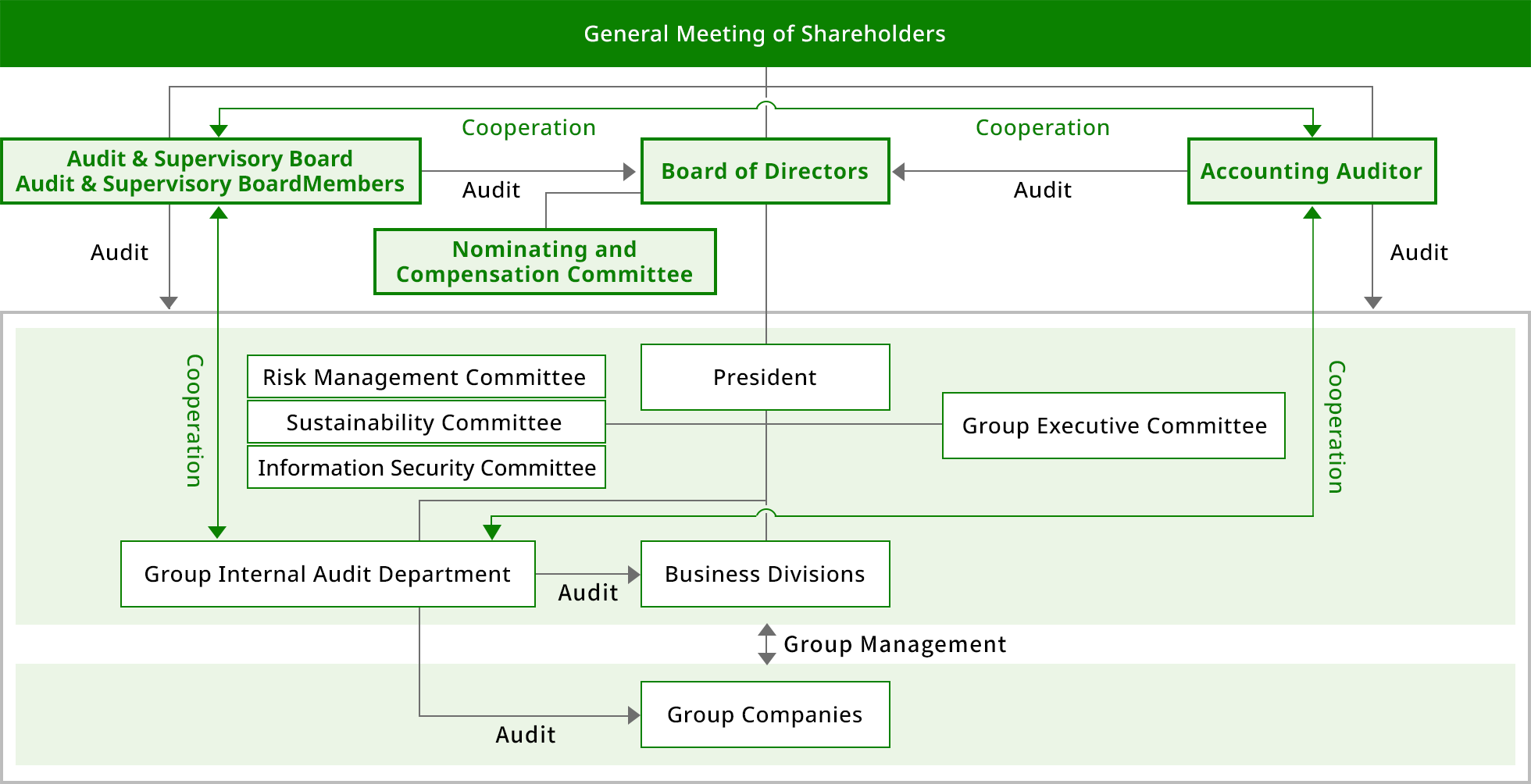
Faced with mounting threats of climate change and environmental challenges, it has become imperative to find solutions to these issues, and we are aware that our business operation's contribution to the environment is crucial in gaining market acceptance.
In our long-term GROUP VISION 2030, we have set “Creating sustainable environment" as a materiality for our value creation efforts, and included environmental management in our company-wide policies. The key environmental opportunities and risks have been identified as follows and KPI targets set accordingly.

With our robust Group-wide effort in environment management, we are implementing climate change initiatives based on TCFD recommendations and reducing environmental impact through our supply chain, aiming to achieve our quantitative targets. At the same time, viewing global-scale environmental challenges as business opportunities, we endeavor to build cutting edge businesses that lead the industry in the pathway to decarbonized society.
We define following short, medium and long-term time horizons for our climate-related strategies:
【Short-term】1- 2 fiscal year(s)
【Medium-term】3- 9 years. Medium-term management plan falls in this time horizon. Our medium-term scenario analysis assumes SBT of 1.5°C in year 2030.
【Long-term】10- 30 years. Long-term management policy falls in this time horizon. Our long-term scenario analysis assumes zero-emission in year 2050.
In setting climate-related strategies, we define magnitude of impacts on our business portfolio
【High】10% or more (of consolidated operating revenue)
【Medium-high】10% or more of the operating revenue for the respective business portfolio
【Medium】5-10% of the operating revenue for the respective business portfolio
【Medium-low】2-5% of the operating revenue for the respective business portfolio
【Low】 Less than 2% of the operating revenue for the respective business portfolio
The Group uses scenario analysis to assess impacts including on upstream and downstream value chain of our different business operations. Scenario analysis has been applied to, and expanded to include, following businesses in accordance with their relevance to climate change risks/opportunities.
【In 2018】Urban development business(medium-term), Resort business(long-term)
【In 2020】Urban development, Resort, Residential, Renewable energy businesses(all medium/long-term)
【Yet to be analyzed】Logistics, Overseas, Human capital-utilizing business
| Year | Overview | Analysis Scenario | Target Business | |
|---|---|---|---|---|
| Medium Term | Long Term | |||
| 2018 | Conducting Scenario Analysis as part of the Environmental Ministry Support Project. | 2℃、4℃ | City | Leisure |
| 2020 | Expansion of the Target Areas Review of Scenario Analysis |
1.5℃、3℃、4℃ | Urban Housing Leisure Renewable Energy |
|
| 2023 | The latest scenario from the IEA Incorporating NZE2050 |
1.5℃, (3℃、4℃) | ||
Serving as the secretariat for the scenario analysis, the Group Sustainability Promotion Department identified, in consultation with the relevant departments, risks and opportunities that may have significant impacts on the business strategy and financial plan. With the help of external consultants, Sustainability Promotion Department conducted quantitative evaluation of the impacts and shared the information within the organization. Furthermore, strategies for likely scenarios are formulated in consultation with the relevant departments, approved by the Sustainability Committee, and reported to the Board of Directors.
We have identified following material climate-related risks and opportunities that have potential impact on the Group :
Real estate business, due to significant greenhouse gas emissions during development and operation stages, is perceived by our group as a transition risk in response to the intensification of climate change, regulatory strengthening in society, rising energy costs, and changes in customer and investor awareness. Furthermore, we recognize the increasing physical risks of climate change in real estate operations.
Particularly, we acknowledge the significant challenges posed by new regulations and the increase in construction and renovation costs associated with the transition to a decarbonized society.
On the other hand, we see the expansion of demand for renewable energy and the growth of the ESG financial market as significant opportunities. Additionally, we perceive the changing awareness of customers as an opportunity, leading to an expanded selection of companies committed to environmental initiatives.
| Category | Type | Material issues | Significant Impact |
|---|---|---|---|
| Current regulation | Current regulation | Energy conservation reporting requirement Energy Efficient Building Codes |
|
| Emerging regulation | More stringent GHG emission reduction regulations Carbon taxation |
〇 | |
| Technology | Increase in cost for ZEB/ZEH construction/renovation | 〇 | |
| Legal cost | Credit purchase under Tokyo Cap-and-Trade Program | ||
| Market | Delayed response to price trend reflecting environmental value Increasing energy cost |
〇 | |
| Reputation | Changing customer/investor behavior | ||
| Physical risks | Acute | Intensified extreme weather events | |
| Chronic | Rising temperature / sea level | ||
| Opportunities | Resource efficiency | Transition to high-efficiency buildings, Recycling | |
| Energy source | Wider use of renewable energy source, government subsidies | 〇 | |
| Products /services | Expanding low carbon products/services | ||
| Market | Utilizing ESG finance | 〇 | |
| Resilience | Energy efficiency renovations of operating assets BCP compliance |
◆IEA(International Energy Agency), SDS(Sustainable Development Scenario), B2DS(Beyond 2 Degrees Scenario), NZE2050(Net Zero by 2050 Roadmap for the Global Energy Sector), IPCC(Intergovernmental Panel on Climate Change), RCP(Representative Concentration Pathways)
Results of Scenario Anaylsis ① 1.5°C Scenario
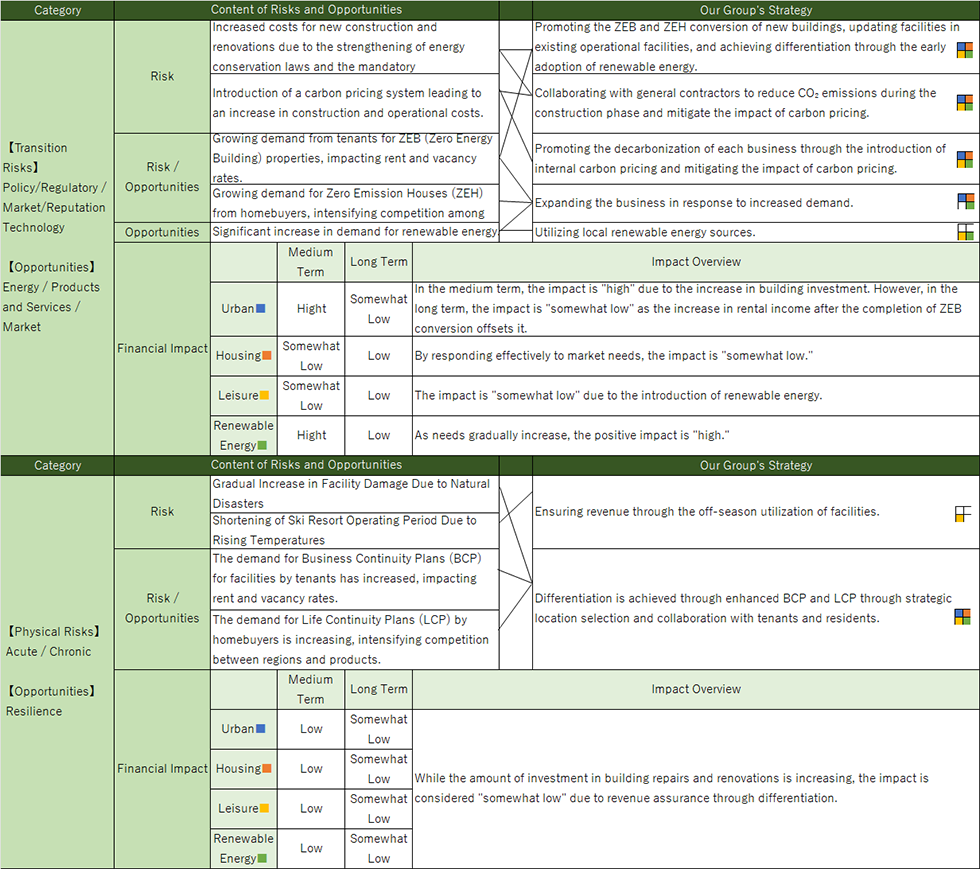
◆NDC(Nationally Determined Contribution), STEPS(Stated Policies Scenario), RTS(Reference Technology Scenario)
Results of Scenario analysis ② 3°C Scenario
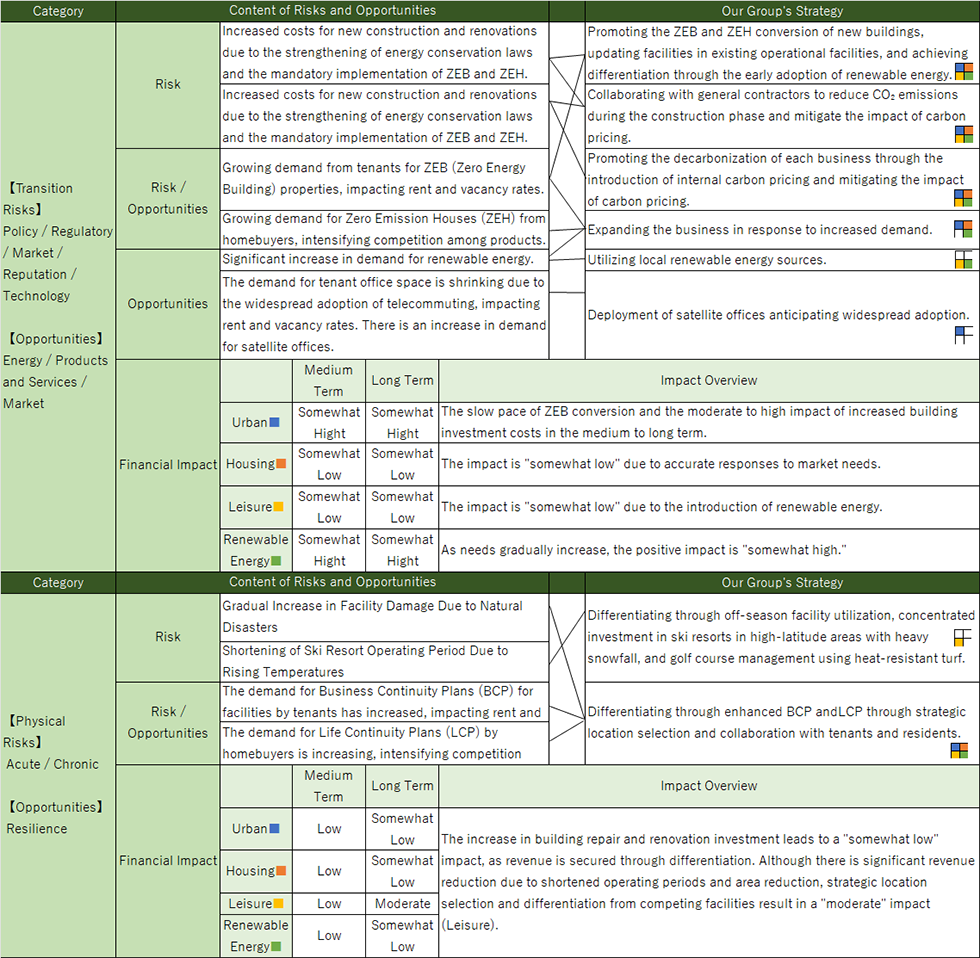
Results of Scenario analysis ③ 4°C Scenario
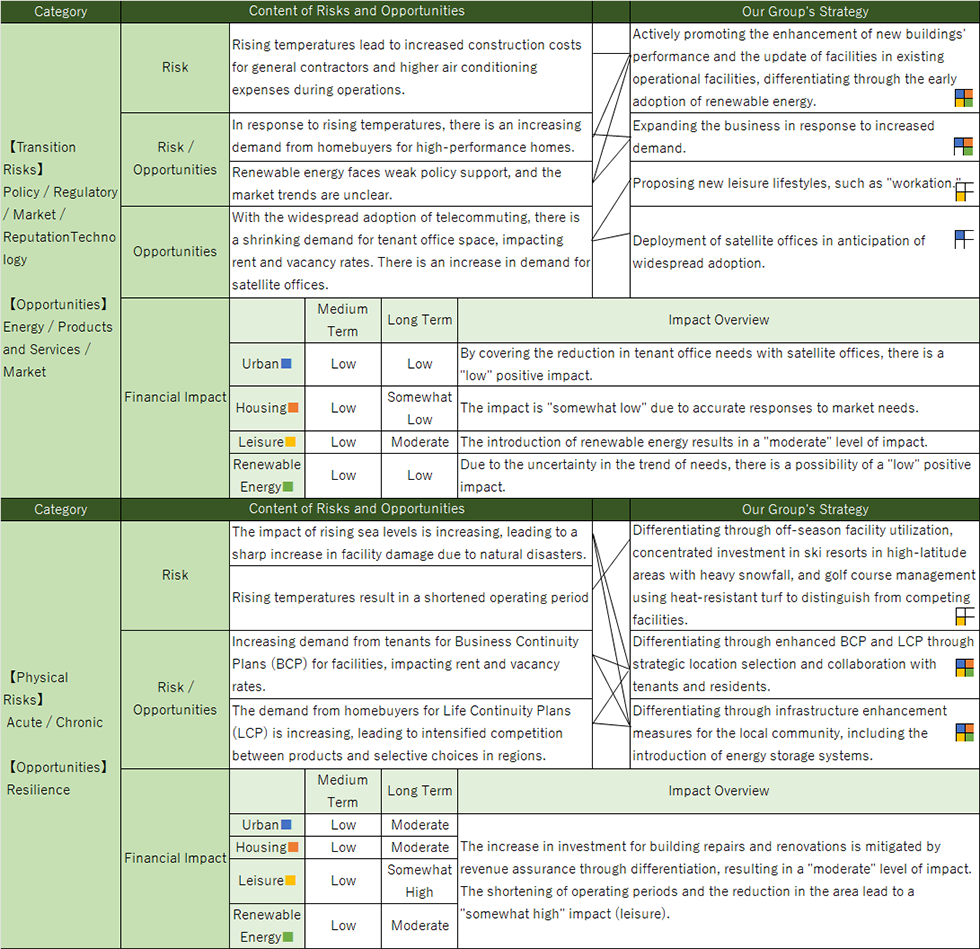
The Group's business strategy has addressed climate change risks/opportunities in following areas:
| Area | Impact and our response |
|---|---|
| Products/services | In addition to our ongoing effort to mitigate risks by energy efficient remodeling and adapt to risks by strengthening BCP for facilities the Group operates, the Group's long-term vision formulated in 2021 aims to further advance ZEB/ZEH. Moreover, Tokyu Land Co. strives to expand and advance ReENE, its renewable energy business. |
| Supply chain/value chain | For upstream, we have addressed climate change issues in the Sustainable Procurement Policy formulated in 2020, and begun exploring how we can cooperate with general contractors to decarbonize construction process. As for downstream, we are expanding ZEH and renewable energy uses into condominiums and rental housings. |
| Research/development investment | Tokyu Community Co., a building management company, has built and acquired Nearly ZEB Certificate on NOTIA, a technical training center to improve its technical proposal capability. Additionally, in the fiscal year 2022, Tokyu Fudosan Co., Ltd. is conducting verification for the implementation of Zero Energy Building (ZEB) conversion in newly constructed small-scale office buildings and existing office buildings. |
| Facility operation | Tokyu Land Co. operating urban/resort facilities, is set to expand use of its own renewable energy, and joined RE100 in 2019, a global environmental initiative which brings together companies committed to 100% renewable energy by 2050. As of December 2022, the company has successfully switched the power supply for all 244 domestic facilities it owns to 100% renewable energy. |
The Group's financial plan integrates the following in response to climate change risks/opportunities:
| Area | Impact and Response |
|---|---|
| Indirect cost | Based on scenario analysis and simulation on marginal CO₂ emission reduction effect of energy efficient renovations and operational improvements at their existing facilities over the medium-/long-term, it was inevitable that Tokyu Land Co. must start purchasing renewable energy and reduce the emission even further if they are to meet the SBT. Intending to offset the emission with electricity from its own renewable energy business, the Company estimated the increase in overhead costs associated with renewable energy purchases. Given the estimate, the Company decided to expedite the introduction of renewable energy at their operating facilities while assessing the budget impact for each fiscal year, aiming to achieve RE100 early. |
| Capital allocation | Aligned with the government's renewable energy promotion measures, Tokyu Land Co. expanded into the large-scale solar business in 2014, in which they have been stepping up investment as the scenario analysis since fiscal 2018 helped them envision the business as a climate-related opportunity. The company operates 66 renewable energy facilities as of the end of March 2022 and has 7 solar power plants, 6 wind power plants, and 2 biomass power plants under development. |
| Liabilities | Based on the scenario analysis, we issued 10 billion yen in Green Bonds in fiscal 2019 to underscore its commitment to environmental issues and to win good reception from investors. In the fiscal year 2021, we formulated the policy "WE ARE GREEN Bond Policy" regarding the long-term issuance of ESG bonds, marking the first of its kind in Japan. We aim to increase the ESG bond ratio to 50% or more by the end of the fiscal year 2025 and 70% or more by the end of the fiscal year 2030. |
| Assets | We have made environmental impacts one of the evaluation indicators for our long-term business portfolio management. |

“Creating a sustainable environment” is one of our 6 priority themes(materiality) on the path to Tokyu Fudosan Holding's long-term GROUP VISION 2030, and environmental management has been the company-wide policy. We reflect on risks and opportunities associated with each materiality in the entire value chain and set KPI targets.
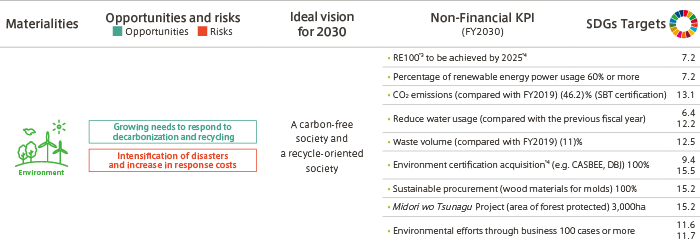
Under the direct oversight of the company president, Tokyu Fudosan Holdings Sustainability Committee develops action plans and oversees performance against the targets on climate change and other important issues.
To ensure reporting compliant with relevant mandates and operate our business in a way that reduces environmental impact including GHG emission, waste, and water consumption, Group Sustainability Promotion Department, serving as a secretariat for the Sustainability Committee, sets targets for GHG emission reduction and other climate-related issues for each fiscal year, monitors performances and communicates information across the Group.
In January 2020, we laid out a Sustainable Procurement Policy to mitigate the impact of GHG emissions on climate change. To achieve this, we work with our stakeholders not only in our business operations but also upstream and downstream value chain and promote better energy efficiency and greater use of renewable energy throughout the lifecycle of products and services.
Tokyu Fudosan Holdings Co. identified 7 risks that possibly hinder the Group's management objectives, and recognized climate change risk as another highly significant emerging risk. To manage these risks, we formulated a Basic Risk Management Policy on which we developed and run a risk management framework.
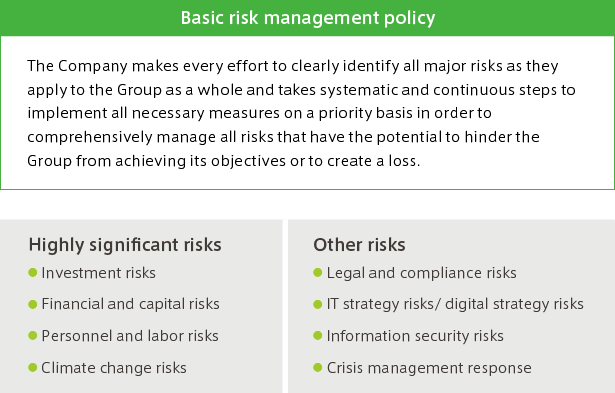
Tokyu Fudosan Holdings Group has set forth medium- and long-term targets linked to climate change in line with our long-term GROUP VISION 2030 developed in 2021, and is committed to materializing decarbonized society through our business.

Based on our identified social materiality, the Groupʼs long-term vision "GROUP VISION 2030" has been organized into six themes with KPI targets in terms of ESG aspects. We established KPI goals for fiscal 2030 for each of these themes, and we are progressing across the Group with initiatives aimed at achieving these goals, while following the PDCA cycle.
Our company group has set indicators and goals for the expansion of renewable energy projects and utilization, in addition to reducing CO₂ emissions, as a mitigation strategy for the transition to a decarbonized society.
Additionally, as adaptive measures to address significant risks and opportunities identified through scenario analysis, we have established the following items listed in the table below as indicators and goals. In addition to mitigation measures outlined in Key Performance Indicators (KPIs), we are also addressing Business Continuity Planning (BCP) measures from the perspective of adaptation to climate change, such as installing watertight boards and elevating electrical rooms to higher floors. We are committed to addressing climate change from both mitigation and adaptation perspectives.
As of January 31, 2025
Materiality
![]()
![]()
![]()
This table can be scrolled horizontally
| KPI | Fiscal 2030 Targets | Fiscal 2025 Targets | Fiscal 2023 results | |
|---|---|---|---|---|
| RE100 to be achieved by 2025*2 | Achieved | Achieved | Achieved*3 | |
| Percentage of renewable energy power usage | 60% or more*4 | 65%*5 | 84.1% | |
| CO₂ emissions*1 (compared with FY2019) | ||||
| Scope1・2 | (46.2)% (SBT certification) |
Year 2023(46.2)% | (70.3)% | |
| Scope3 | (46.2)% (SBT certification) |
Qualitative goal : Collaborative efforts with business partners such as construction companies | (11.9)% | |
| Water usage | Reduction compared to the previous year | Reduction compared to the previous year | +9.1% | |
| Waste volume (compared with FY2019) | (11)% | (6)% | (16.6)% | |
| Environment certification acquisition (e.g. CASBEE, DBJ)*6 | 100% | 70% | 65.0% | |
| Sustainable procurement (wood materials for molds) | 100% | 30% | 9.7% | |
| Midori wo Tsunagu Project (Area of Forest Protected) | 3,000ha | 2,400ha | 2,145ha | |
| Environmental efforts through business | 100 cases or more | 50 cases or more | 70 cases | |
Environment approved by the board of directors, Named position responsible ...
Goals, Initiatives, and Achievements Quantified CO₂ reduction targets ...
Targets in the investment process ① Electrical facility: Introdu...
Company position on public policy for mitigating climate change Tokyu La...
Support for mitigating climate change through Membership of business associ...
Efforts, Supports and Involvement for activities to avoid climate change ...
Tokyu Land Corporation implements the following management process as a cou...
Tokyu Fudosan Holdings measures the energy efficiency of all real estate pr...
In office buildings and commercial facilities operated and managed by Tokyu...
The Group works to reduce CO2 emissions in the office buildings it manages ...
The 356-unit Branz City Shinagawa Katsushima is a large condominium buildin...
Initiatives towards ZEB and ZEH TOKYU COMMUNITY Technology Training Cent...
Program to promote corporate value improvement through decarbon management ...
Third-party Independent Verification The Tokyu Fudosan Holdings Group rece...
Tokyu Fudosan Holdings Corporation has formulated the "TCFD/TNFD Report," w...
INTRODUCTION Introduction -Nature Positive as a Global Goal- Global env...
Risk and impact management Climate Nature ...
Metrics and targets Climate Metrics / targets ...
Transition plan for a decarbonized society Climate ...
Climate- and nature-related initiatives Examples of climate-related init...
Reference materials, terms, and explanations Appendix: Architecture of t...
Tokyu Fudosan Holdings Group makes a commitment to environmental issues an ...
Governance Sustainability Committee to assess and manage climate-related...
Strategy Faced with mounting threats of climate change and environmental...
Risk management Identifying / assessing climate-related risks/opportunit...
Metrics and targets Climate change-related targets in our long-term GROU...
Tokyu Fudosan Holdings Group makes a commitment to environmental issues an ...
Planning and management at the project site Biodiversity Action Plan (BA...
Creation of “Invasive Alien Species Response Manual” According to the In...
Biodiversity risk assessment(Disclosure of biodiversity habitat) ~ Conducti...
《Existing project》For example, at the roof terrace garden named Omohara For...
At "Tokyo Port City Takeshiba Office Tower", we are working on environmenta...
“Tambara Ski Park" has been working to protect ‘forest green tree frogs’, w...
Participation in biodiversity certification systems Systematic applicati...
Obtained the highest rank (AAA) of "JHEP Certification The FUTAKO TAMAGA...
Disclosure of engagement on efforts to reduce loss of biodiversity Gover...
The Tokyu Fudosan Holdings Group has established environmental management a...
INTRODUCTION Introduction -Nature Positive as a Global Goal- Am...
Nature-Related Information Disclosure in line with TNFD G...
Risk and impact management Risk and impact management ...
Metrics and Targets P Metrics and Targets ...
Goals, Initiatives, and Achievements Process targets to reduce or avoid ...
Tokyu Land Corporation has rigorous performance standards for its newly bui...
The Group's office buildings, commercial facilities and resorts manage and ...
Measurement of NOx, SOx, emissions According to the Air Pollution Contro...
Management Structure The Group has established the Sustainability Commit...
Process targets to reduce or avoid waste: Tokyu Land Corporation has set...
The Tokyu Fudosan Holdings Group is working to reduce waste through home re...
Ratio of establishments receiving environmental management certification ...
Working with others to reduce waste or resource use by Participation in spe...
Use of LCA (Life Cycle Analysis) The Tokyu Fudosan Holdings is developin...
Management Structure The Group has established the Sustainability Commit...
Progress against previously set targets to reduce resource use: Quantifi...
Forming a reuse cycle for wood resources The Green Connection Project is...
The Tokyu Fudosan Holdings Group has invested in a company that promotes th...
Management Structure The Group has established the Sustainability Committe...
Water conservation measures Water management plan Tokyu Land Corporat...
Reducing water use with water saving systems and features The Tokyu ...
Initiatives Along the Tama River - Environmental Conservation of the River ...
Initiatives in water-scarce regions Engagement, water withdrawal, etc. ...
Business activities in water-scarce regions The Republic of Palau is chr...
Works with others Works with others to reduce water use Tokyu Fudosan...
Collaboration with other companies operating at same sites such as making u...
Costs associated with water-related risks The cost of water-related risk...
The number of incidents of non-compliance with water quality/quantity permi...
Third-party Independent Verification The Tokyu Fudosan Holdings Group rece...
Goals, Initiatives, and Achievements Results on goals of acquisition of en...
Targets and performance on water usage from property portfolio Water Use...
Training and providing programs to raise employees' environmental awareness...
Environmental policies integrated with suppliers through Training of releva...
Tokyu Fudosan Holdings has introduced a green lease clause in some of the l...
Operating energy management systems together with tenants Tokyu Land Cor...
Tokyu Fudosan Hodings participate in the Environmental Management Committee...
Commitment to Green Field Development Commitment to Green Field Developm...
Measures to reduce energy and water consumption Aggregate energy data at...
Tokyu Community Corporation has been selected to be an MEMS aggregator as a...
Reducing water use with water saving systems and features The Tokyu ...
Reduction of water usage by using rainwater The office building "Kasumig...
As a member of the Keidanren Nature Conservation Council, Initiatives fo...
Tokyu Fudosan Holdings distributes the Sustainable Procurement Policy to it...
No-Deforestation Commitment Much of plywood used for concrete formwork i...